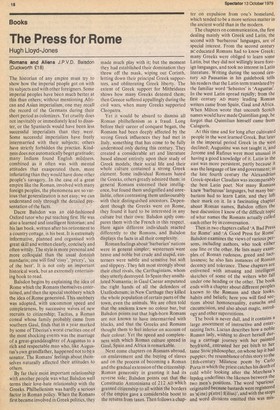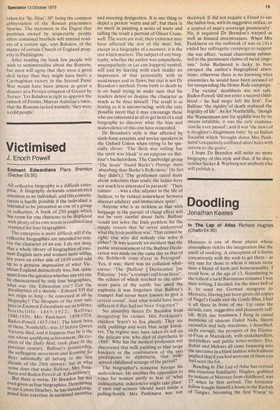The Press for Rome
Hugh Lloyd-Jones
Romans and Aliens J.P.V.D. BaIsdon (Duckworth £18)
The historian of any empire must try to show how the imperial people got on with its subjects and with other foreigners. Some imperial peoples have been much better at this than others; without mentioning African and Asian imperialism, one may recall the record of the Germans during their short period as colonizers. Yet cruelty does not inevitably or immediately lead to disaster, or the Spaniards would have been less successful imperialists than they were. Some successful imperialists have freely intermarried with their subjects; others have strictly forbidden the practice. Kindness does not automatically beget gratitude; many Indians found English mildness, combined as it often was with mental attitudes that exasperated them, more infuriating than they would have done other people's savagery. In the case of a great empire like the Roman, involved with many foreign peoples, the phenomena are so various that generalization is not easy; we can understand only through the detailed presentation of the facts.
Dacre Balsdon was an old-fashioned Oxford tutor who put teaching first. He was also a learned and intelligent historian; and his last book, written after his retirement to a country cottage, is his best. It is extremely informative, planned and organised with great skill and written clearly, concisely and often wittily. The style is more personal and more colloquial than the usual donnish mandarin; one will find `cissy', 'pricey', 'six of the best'. It is not only an important historical work, but an extremely entertaining book to read.
Balsdon begins by explaining the idea of Rome which the Romans themselves entertained, and then the special snobbery which the idea of Rome generated. This snobbery was adopted, with uncommon speed and completeness, by successive waves of new recruits to citizenship; Tacitus, a Roman consul whose family probably came from southern Gaul, finds that in a year marked by some of Tiberius's worst cruelties one of the most shocking events was the marriage of a great-granddaughter of Augustus to a rich and respectable man who, like Augustus's own grandfather, happened not to be a senator, The Romans' feelings about themselves naturally affected their attitudes to others.
By far their mot important relationship with another people was what Balsdon well terms their love-hate relationship with the Greeks. Philhellenism was hardly a serious factor in Roman policy, When the Romans first became involved in Greek politics, they made much play with it; but the moment they had established their domination they threw off the mask, wiping out Corinth, letting down their principal Greek supporters, and obliterating Greek liberty. The extent of Greek support for Mithridates shows how many Greeks detested them; then Greece suffered appallingly during the civil wars, when many Greeks supported Cleopatra.
Yet it would be absurd to dismiss all Roman philhellenism as a fraud. Long before their career of conquest began, the Romans had been deeply affected by the strong Greek influences they had met in Italy, something that has come to be fully understood only during this century. They created a considerable art and literature based almost entirely upon their study of Greek models; their social life and their whole culture contained a strong Greek element. Some individual Romans hated the Greeks, others greatly admired them: in general Romans esteemed their intelligence, but found them undignified and unreliable, often contrasting them unfavourably with their, distinguished ancestors. Dependent though the Greeks were on Rome, they found it hard to be interested in any culture but their own: Balsdon aptly compares them with the French in this respect. Here again different individuals reacted differently to the Romans, and Balsdon displays the facts in all their complexity.
Roman feelings about 'barbarian' nations were in general simpler; westerners were brave and noble but crude and stupid, easterners were subtle and sensitive but soft and slippery. They felt most strongly about their chief rivals, the Carthaginians, whom they utterly destroyed. In Spain they annihilated Numantia; in Gaul Caesar amputated the right hands of all the defenders of Uxellodunum; in New Carthage they killed the whole population of certain parts of the town, even the animals. We are often told that the ancients knew no colour bar, but Balsdon points out that high-born Romans are not known to have intermarried with blacks, and that the Greeks and Romans thought them to feel inferior on account of their colour. Yet the speed and completeness with which Roman culture spread in Gaul, Spain and Africa is remarkable.
Next come chapters on Romans abroad, on enslavement and the buying of slaves and on the process of becoming a Roman and the gradual extension of the citizenship. Roman generosity in granting it had its reverse side; Balsdon points out that the Constitutio Antoniniana of 212 AD which granted citizenship to all within the borders of the empire gave a considerable boost to the returns from taxes. Then follows a chap ter on expulsion from one's homeland, which tended to be a more serious matter in the ancient world than in the modern.
The chapters on communication, the first dealing mainly with Greek and Latin, the second with 'barbarous' languages, are of special interest. From the second century BC educated Romans had to know Greek; many Greeks were obliged to learn some Latin, but they did not willingly learn foreign languages, and took no interest in Latin literature. Writing during the second century AD Pausanias in his guidebook tells his readers that the Latin term translated by the familiar word `Sebastos' is 'Augustus'. In the west Latin spread rapidly; from the first century AD many leading Roman writers came from Spain, Gaul and Africa. When Milton wrote that uncouth Scotch names would have made Quintilian gasp, he forgot that Quintilian himself came from Calaguris.
At this time and for long after cultivated people in the west learned Greek. But later in the imperial period Greek in the west declined; Augustine was not taught it, and Jerome and Rufinus were most unusual in having a good knowledge of it. Latin in the east was more persistent, partly because it was the language of law and government; in the late fourth century the Alexandrian Greek-speaker Claudian was incomparably the best Latin poet. Not many Romans knew 'barbarous' languages, but many barbarians had to learn Latin, and they left their mark on it. In a fascinating chapter about Roman names, Balsdon offers the best discussion I know of the difficult topic of what names the Romans actually called each other by in conversation. Then in two chapters called 'A Bad Press for Rome' and 'A Good Press for Rome Balsdon examines the views of various persons, including authors, who took either one line or the other. He lists many examples of Roman rudeness, greed and tactlessness; he also lists instances of Roman decency and tolerance. These chapters are enlivened with amusing and intelligent sketches of some of the writers who fall under one heading or the other. The book ends with a chapter about different peoples known to the Romans and their looks, habits and beliefs; here you will find sections about homosexuality, eunuchs and circumcision, and also about magic, astrology and other superstitions.
The book is never dull, and it contains a large assortment of instructive and entertaining facts, Lucian describes how a noble Roman lady, wishing to divert herself during a carriage journey with her painted boyfriend, entrusted her pet bitch to her tame Stoic philosopher, on whose lap it had puppies; the resemblance of this story to the 18th-century Milanese poem by Carlo Porta in which the priest catches his death of cold while looking after the Marchesa s lapdog underlines the likeness between the two men's positions. The word 'spurious originated because bastards were registered as 's(ine) p(atre) f(ilius)', and with the stops and word divisions omitted this was tilts taken tot 'Sp, Mins', SP. being the common abbreviation of the Roman praenomen Spurn's. 1 he statement in the Digest that premises owned by respectable people often contained brothels will remind readers of a certain age, says Balsdon, of the matter of certain Church of England property in Paddington.
After reading the book few people will wish to sentimentalise about the Romans, but most will agree that they were a good deal better than they might have been; a Carthaginian victory in the Second Punic War would have been almost as great a disaster as a Persian conquest of Greece by Xerxes. Yet Balsdon is right to approve the remark of Fronto, Marcus Aurelius's tutor, that the Romans lacked warmth; 'they were a cold people'.



































 Previous page
Previous page